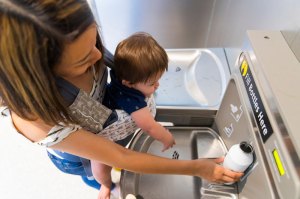#FillBeforeYouFly: Why Alaska is urging guests to bring their own water bottles
Share

In 2019, we encouraged guests to join our efforts by bringing a reusable water bottle when they travel and #FillBeforeYouFly, as part of an initiative to completely avoid using single-use plastics.
Mason jar packed with greens and veggies? Yep. A complete set of bamboo utensils? Got ‘em.
And maybe the most important item on Alaska Airlines flight attendant Rosie Tran’s pack list? Her own reusable water bottle – a key part of her holistic approach to wellness. “We can do so much for our own health, and for the health of the planet at the same time,” says Tran, who posts her tips on Instagram at @kaleintheclouds.
Today, Alaska is inviting guests to join flight attendants like Tran and #FillBeforeYouFly – a new initiative encouraging guests and employees to bring their own water bottles and become active partners in the airline’s goal to reduce single-use plastics. Members of Alaska’s Green Team, a group of employees devoted to education and innovation around environmental issues, will be at Seattle-Tacoma International Airport this morning to hand out water bottles provided by environmental leader MiiR, and to direct guests to water-filling stations. (See the Port of Seattle’s map for Sea-Tac locations.)

“This is so exciting to get guests involved because it takes everybody to make a difference,” says Kim Fisher, Alaska reservations call center specialist and co-leader of the Green Team. “It can be so overwhelming to think about the environment, but the truth is everything we do counts.”
“We’re passionate about working with our guests, employees, airports and partners to reduce waste, protect habitats and improve water health,” says Diana Birkett Rakow, Alaska Airlines’ vice president of external relations. Plastics are among the top items found during beach cleanups worldwide, environmental organizations report. “Land, water and animals are incredibly special parts of the places we live and fly,” she says. “If just 10% of us flying Alaska bring our own prefilled water bottles when we fly, it would save over 700,000 plastic water bottles and 4 million plastic cups per year. That’s a big lift.”
[inset]
To extend the initiative’s effect, Alaska Airlines is partnering with the Bonneville Environmental Foundation to plant a tree for every passenger who brings a prefilled water bottle on an Alaska flight and posts it to social media with the hashtag #FillBeforeYouFly. BEF’s goal is to plant 1 million trees on the West Coast to help reduce pollution and restore habitats for local fish and wildlife.
The “fill before” part of #FillBeforeYouFly is critical to the effort because Alaska policy doesn’t allow for personal water bottles to be filled directly during inflight beverage service. The policy is in place to manage the limited quantities of water available on flights.
The Green Team hopes guests will embrace #FillBeforeYouFly, which builds on years of efforts by Alaska and Horizon employees to reduce plastic waste throughout the companies:
- In 2018, Alaska was the first major American airline to replace plastic straws and citrus picks on planes with marine-friendly alternatives. The effort, achieved in partnership with the environmental nonprofit Lonely Whale, eliminated 22 million pieces of inflight plastic waste each year. Lonely Whale is also a key partner in the #FillBeforeYouFly initiative, which aligns with Lonely Whale’s #HydrateLike campaign, popular on social media channels and inspiring individuals and companies to rethink reliance on single-use plastic bottles.
- Alaska also recently replaced bottled beer with aluminum cans, which are lighter and easier to recycle.
- In 2017, David Clarke, then a Horizon Air maintenance supervisor at Portland International Airport, found money in the budget to buy the Portland maintenance technicians their own personal water bottles and install three water fountains around the hangar and near the breakroom. The goal was to save the cost of buying pallets of plastic water bottles during hot summers, Clarke says – but the benefits multiplied: “Yes, it was an economic win by saving money,” he says. “It was also an environmental win in saving plastic. And a health win by encouraging people to drink more water.” Those water fountains, which have counters on them, have saved 176,621 water bottles so far just at the Portland hangar.
Alaska continues to look for ways to reduce its environmental impact – and has begun exploring alternatives to plastic water bottles and cups – but everyone realizes there is a lot of work ahead.
“We know this is a resource-intensive business with many stakeholders involved in the journey,” Birkett Rakow says. “We’re working with supply-chain partners and employees to come up with solutions to reduce waste, adopt sustainable practices and eliminate single-use plastics inflight.”
“Change takes time,” she says. “We value the collective impact our customers and employees can make today.”
Tran is excited to spread the word about #FillBeforeYouFly to her tens of thousands of social media followers, and she points out that an extra benefit of carrying a personal water bottle is that it’s a tangible reminder to hydrate regularly – vital for anyone who flies. “If you’re not careful, it can be so easy to use so much waste while traveling,” she says. “How I carry my food and hydrate can make a big difference.”
Green Team co-leader Fisher also has eliminated single-use plastics as much as possible in her life: She doesn’t use plastic bags ever – “If we forget one, we walk out of the store with a handful of groceries!” – and she always carries a reusable bottle and bamboo utensil kit. “Little things can have such a big impact,” Fisher says. “And let’s be honest: It’s not going to kill us to make these changes.”
